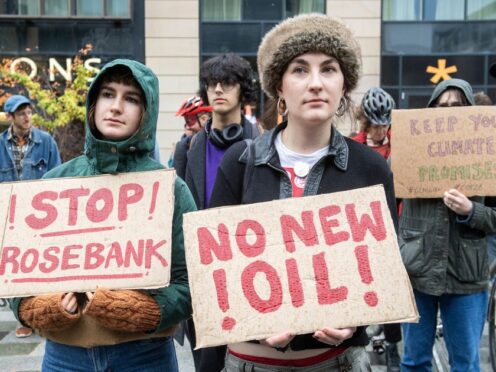
Banks are being urged to stop providing finance to a company behind the controversial development of the Rosebank oil field, northwest of the Shetland Islands in the North Sea.
More than 80 organisations, including Make My Money Matter, Greenpeace UK and Global Witness, have written to the chief executives of 12 major banks, including NatWest, Lloyds and HSBC.
The signatories urged the banks to stop providing funding for Ithaca Energy, an oil and gas operator in the North Sea, which is investing billions in the Rosebank development alongside Norwegian oil major Equinor.
According to Banking on Climate Chaos’s 2023 report relating to finance between 2016 and 2022, Lloyds provided 78 million dollars (£61m), HSBC provided 60m dollars (£47.0m) and Natwest provided 78m dollars (£61m) to Ithaca Energy.
The letter noted that most of the 12 banks are in the Net Zero Banking Alliance, which requires them to align with the Paris Agreement of trying to limit warming to 1.5C and commit to the transition towards green energy.
HSBC, Lloyds and NatWest have publicly pledged to stop directly financing new oil and gas projects.
However, the pledge does not include corporate level financing to energy clients, who can then chose to use it to fund new projects themselves.
It is understood that Lloyds has no outstanding lending with Ithaca and sold down its debt facilities with the company in 2023.
The letter cited the International Energy Association’s Net Zero by 2050 roadmap, which found that in order to meet the target, “no new oil and natural gas fields are required beyond those that have already been approved for development” with final investment decisions in 2021.

Ithaca’s final investment decision in Rosebank was announced in 2023, with signatories saying it was “clearly not aligned with limiting global warming to 1.5C”.
Signatories said that the new project will add to Ithaca’s carbon footprint and therefore those of the banks’ financed emissions.
The letter also called on the banks to refrain from providing any future financing to Ithaca, including facilitating capital market activities and providing advisory services.
The letter told chief executives: “Any future financing, including advisory services, to Ithaca Energy would expose your bank to significant risks if the company moves forward with the Rosebank field and other expansion projects.
“These include risks to the bank’s reputation, possible legal and regulatory claims, as well as potential impact on investor expectations.”
It comes as the Government has faced legal challenges in the Scottish courts after standing by the decision to give the go-ahead for drilling at the oil field.
Lauren MacDonald, from the Stop Rosebank campaign, said: “Rosebank is the poster child for North Sea oil and gas expansion, so why are these banks – some of whom say they no longer support new fossil fuel projects – providing billions to its minority owner, who has no plans to dial down oil and gas drilling?
“If the project goes ahead, it will emit more CO2 emissions than the 28 lowest income countries produce in a year combined, while Ithaca rakes in hundreds of millions.
“If these banks are serious about their climate pledges and tackling the climate crisis, they must stop this blatant greenwashing and cease financing Ithaca until it pulls the plug on Rosebank.”
Henrieke Butijn, climate campaigner and researcher at BankTrack, said: “Ithaca is a company that is purely focused on North Sea oil and gas and its expansion, with no interest in renewables.
“Banks that finance companies like this are making a mockery of their climate commitments.
“But worse than that, their finance is shattering our chances of staying below 1.5 degrees Celsius, and aggravating the impacts of climate chaos that especially communities of colour and those in the Global South already have to deal with every single day.”
PA has contacted HSBC, Natwest and Ithaca Energy for comment.

Enjoy the convenience of having The Sunday Post delivered as a digital ePaper straight to your smartphone, tablet or computer.
Subscribe for only £5.49 a month and enjoy all the benefits of the printed paper as a digital replica.
Subscribe